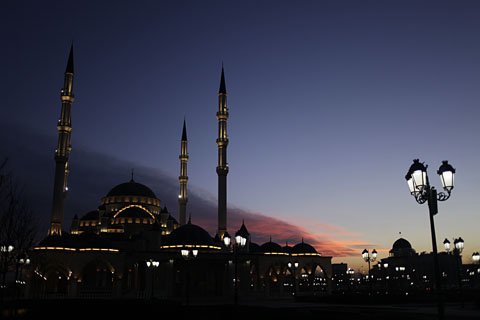
Islam Is Seeking a Greater Role in Russia
Publication: Eurasia Daily Monitor Volume: 12 Issue: 100
By:

Since the second half of the 18th century, when Catherine the Great realized that Russia would not be able to Christianize the Muslims in its conquered territories, the Russian government decided to give some autonomy to Muslims. In turn, the latter organized their lives according to sharia law. A hundred years after conquering the Caucasus in the 19th century, the Russian authorities had failed to Christianize the North Caucasian peoples and were forced to allow locals to use sharia law in some cases. Later, the Soviet authorities, who came to power in the North Caucasus in 1920 with promises not to touch the foundations of sharia in the lives of the Muslims of Russia, attempted to uproot sharia across the country using the most extreme measures. Sharia did not disappear, however, but persisted underground, governing the lives of Muslims in defiance of Soviet laws. Following the break-up of the Soviet Union in 1991, sharia strengthened its appeal among the Muslims of Russia and became a subject of debate in society (Umma.ru, accessed May 29).
The issue of polygamy has been widely discussed in Russia in the last several weeks, and is not simply due to the controversy over the scandalous marriage of a Chechen top police official to a 17-year-old girl (Novayagazeta.ru, May 20). The issue of legalizing sharia has become relevant in Russia against the backdrop of the Russian-Chechen wars of the past 20 years, the powerful Islamization trend in the North Caucasus, and the spread of radicalism and Salafism.
It is not surprising that a high-ranking official in Ramzan Kadyrov’s inner circle, practically his right hand man, Magomed Daudov, declared he intended to introduce sharia law in the republic, especially the parts of sharia that govern polygamy. Daudov did not make an official statement, but expressed his personal opinion: “I am not a [parliamentary] deputy now, but it would be good if polygamy were legalized,” he said. “But everything should be done according to sharia—if a man can support another wife, why not? This is widespread anyway and it would be good to regulate it” (Gazeta.ru, May 18). It should be noted that polygamy did not cease to exist even under militant Soviet atheism. Polygamous families were not rare, and all the people in the villages and small towns where they lived usually knew about them.
The imam of Makhachkala’s central mosque did not simply endorse polygamy in Russia, but proposed encouraging it. “This will result in a demographic boost in the population, which is quite critical in the current circumstances of demographic decline. Men who consciously choose to participate in this can be considered patriots, because they take care of two, or even three or four families. Such men should receive encouragement” (Regnum, May 20).
It is not only the Muslims of the North Caucasus who support polygamy in Russia. The mufti of Moscow, Ildar Alyautdinov, who sits on the Council of Muftis of Russia, also spoke in favor of legalizing polygamy. “It would be a correct thing to do to make such marriages legal for Muslims under certain conditions,” Alyautdinov said (Rosbalt.ru, May 26). The Moscow mufti realizes that polygamy persists, but has never been legalized in Russia since the demise of the Russian Empire in 1917.
The issue of polygamy in Russia has another side to it—the age of the second wife. In 99 out of 100 cases, the man marries an underage female as his second wife. People under 18 are considered to be underage in the Russian Federation. There is the issue of age criteria because in Russian Islamic culture, the underage period ends after the person reaches 14–15 years of age. This is a fairly common view among North Caucasians (Kavkazsky Uzel, May 14).
Members of the Russian parliament also weighed in on polygamy, with some calling for it to be criminalized as it was under Soviet legislation (Mk.ru, May 18). Others, such as the head of the State Duma Committee on Family, Women and Children, Yelena Mizulina, said that criminalizing it would look silly (TASS, May 18).
The issue is more than simply a person’s wish to have a second wife. Rather, millions of Muslims in Russia have started to consider more seriously the possibility and the necessity of introducing sharia into their lives. This was hard to imagine twenty years ago, but today it is openly discussed in Russia. Whether people are for it or against it matters less than the fact that people in Russia are discussing it, which means the problem has become quite serious. The discussion is closely aligned with the Kremlin’s interest, however, as Moscow intentionally turns a blind eye on issues that contradict the constitution of the Russian Federation and public norms. For example, Moscow tolerates the Chechen government’s illegal requirements that all females who have come of age wear the hijab, that all men wear a short beard, that special clothes be worn for Friday prayers, that alcohol be banned, and so on. Moscow permitted these religious symbols in Chechnya’s public life in exchange for the regional authorities’ loyalty. Moscow is trying to deprive the armed opposition movement of its primary trump card in challenging the government—accusations that the authorities ban certain Islamic norms—and this marks big progress on the Russian government’s part. The North Caucasian militants no longer claim that certain things are banned by the government; indeed, they have been forced to switch to different rhetoric, asserting that the authorities are persecuting the true Muslims—the Salafis. Many Muslims, even if they do not support the rebels, appear to support the idea that Russia must accommodate their views by providing greater space for sharia in their lives.




